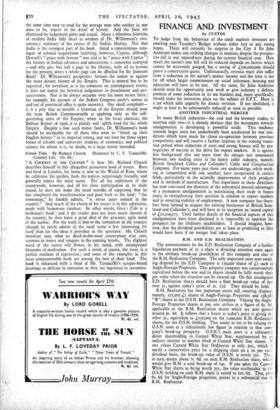FINANCE AND INVESTMENT
By CUSTOS
To judge from the behaviour of the stock markets investors are awaiting next Tuesday's "Budget without either fear or any strong hopes. There will certainly be surprise in the City if Sir John Anderson makes any striking changes in taxation, despite the prospec- tive fall in war expenditure during the current financial year. How much the nation's war bill will be reduced depends on factors which cannot be accurately gauged, but a saving , of £5oo,000,000 should prove a conservativesguess. Unfortunately, revenue must alio suffer from a reduction in the nation's money' income and the time is not far off when larger commitments on social insurance, housing and education will have to be met. All the same, Sir John Anderson should seize his opportunity next week to give industry a -definite promise of some reduction in its tax burdens and, more specifically, should make his intentions plain on the subject of E.P.T. Here is a tax' which calls urgently for drastic revision. If not abolished, it ought at least to be substantially reduced as soon as possible. To judge from the behaviour of the stock markets investors are awaiting next Tuesday's "Budget without either fear or any strong hopes. There will certainly be surprise in the City if Sir John Anderson makes any striking changes in taxation, despite the prospec- tive fall in war expenditure during the current financial year. How much the nation's war bill will be reduced depends on factors which cannot be accurately gauged, but a saving , of £5oo,000,000 should prove a conservativesguess. Unfortunately, revenue must alio suffer from a reduction in the nation's money' income and the time is not far off when larger commitments on social insurance, housing and education will have to be met. All the same, Sir John Anderson should seize his opportunity next week to give industry a -definite promise of some reduction in its tax burdens and, more specifically, should make his intentions plain on the subject of E.P.T. Here is a tax' which calls urgently for drastic revision. If not abolished, it ought at least to be substantially reduced as soon as possible. ANOTHER INDUSTRIAL MERGER In many British industries—the coal and the brewery trades, to mention only two—it is already obvious that the movement towards amalgamation is- developing a powerful stride. This tendency towards larger units has undoubtedly been accelerated by war con- ditions which have made for closer co-operation between previous competitors, and will receive a further impetus in the coming transi- tion period when reduction of costs and strong finance will be pre- requisites of success in the drive for export markets. It is against this background that one must view the merger just announced between two leading units in the heavy cable industry, namely, British Insulated Cables and Callender's Cable and Construction Company. For many years past these two undertakings, while work- ing in competition with one another, have co-operated in certain fields, particularly in the scientific improvement of their products and in methods of manufacture. Past experience in these directions has now convinced the directors of the substantial mutual advantages of a permanent amalgamation in maintaining their trade in future years, in strengthening their position in relation • to export markets and in ensuring stability of employment. A new company has there- fore been formed to acquire the existing businesses of British Insu- lated and Callender's, and will have at its inception an issued capital of £11,219,175. Until further details of the financial aspects of this amalgamation have been disclosed it is 'impossible to appraise the prospects for the Ordinary stockholders. I Should imagine, how- ever, that the dividend possibilities are at least as promising as they would have been if no merger had taken place.
R.M. AND E.D. REALISATION
The announcement by the E.D. Realisation Company of a further liquidation payment of Is., a share is directing attention once again to the ultimate break-up possibilities of this company and also of the R.M. Realisation Company. The only important asset now await- ing disposal by the E.D. Company is 130,000 shares of LI each- in Anglo-Foreign Properties. This property company was conservatively capitalised before the war and its shares should be fulls worth their par value when the situation can be cleared up. On that assumption E.D. Realisation shares should have a final break-up value of just over 3s., against today's price of 2S. rfd. They should be held.
R.M. Realisation has two important assets still awaiting disposal, namely, 325,000 £i shares of Anglo-Foreign Properties and 138,582 " B " shares in the O.S.N. Realisation Company. Valuing the Anglo- Foreign Properties shares at par, one arrives at a figure of 6s. 6d. applicable to the R.M. Realisation shares which are now quoted
around 9s. 6d. follows that a buyer at today's price is giving the other' 3s., -equivalent to L150,000 on the i,000,000 R.M. Realisation shares, for the O.S.N. holding. That seems to me to be valuing the O.S.N. asset- at a ridiculously low figure in relation to that com- pany's break-up prospects. O.S.N.'s main asset is a substantial direct shareholding in Cunard White Star, supplemented by an indirect interest in another block of Cunard White Star shares. If one values Cunard White Star Ordinaries at only 3os., which is surely a conservative price for a shipping share nn g to per cent. dividend basis, the break-up value of O.S.N. is nearly 55s. That, in turn, means about 7s. 6d. on each R.M. Realisation share, which would give R.M. a total break-up of 14s. If one takes the Cunard White Star shares as being worth 35s., the value attributable to the O.S.N. holding on each R.M: share is raised to Los. 6d. That, plus 6s. 6d. for Anglo-Foreign properties,' points to a substantial rise in R.M. Realisation


























 Previous page
Previous page